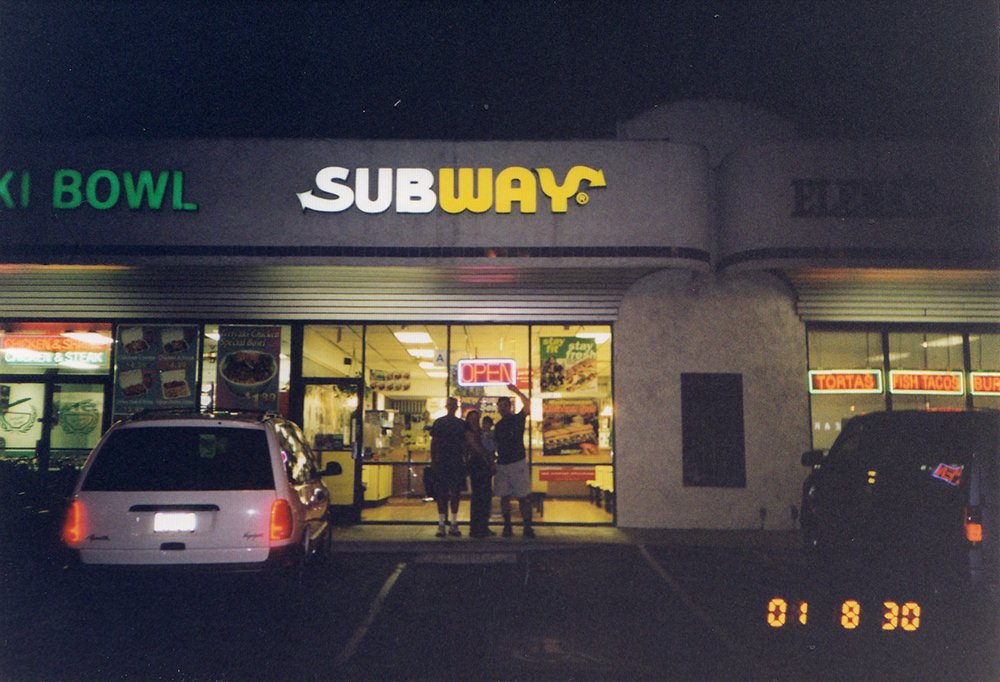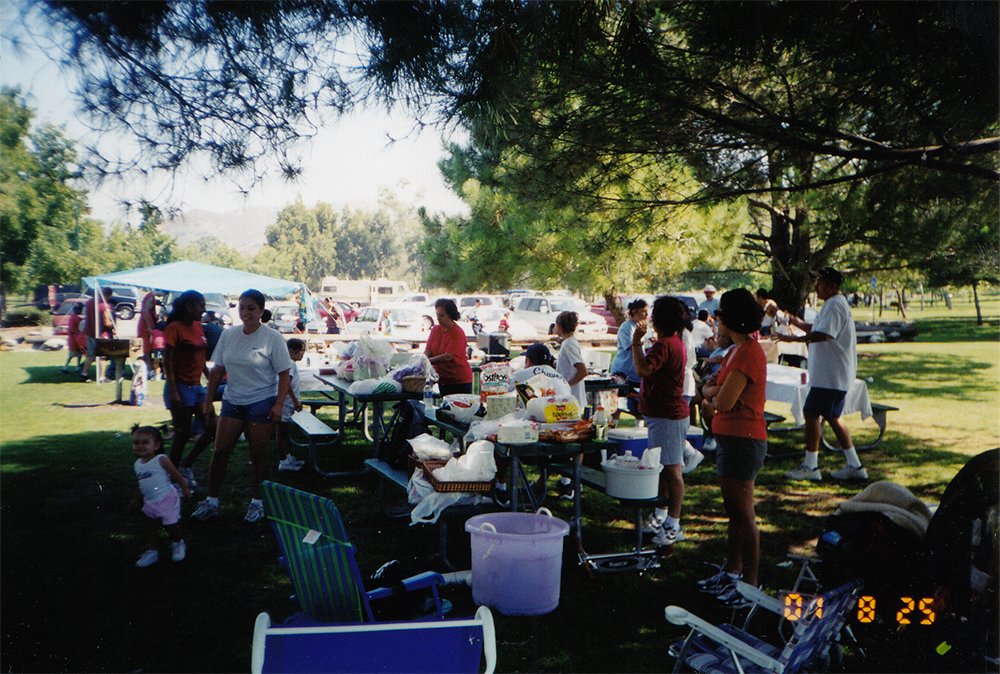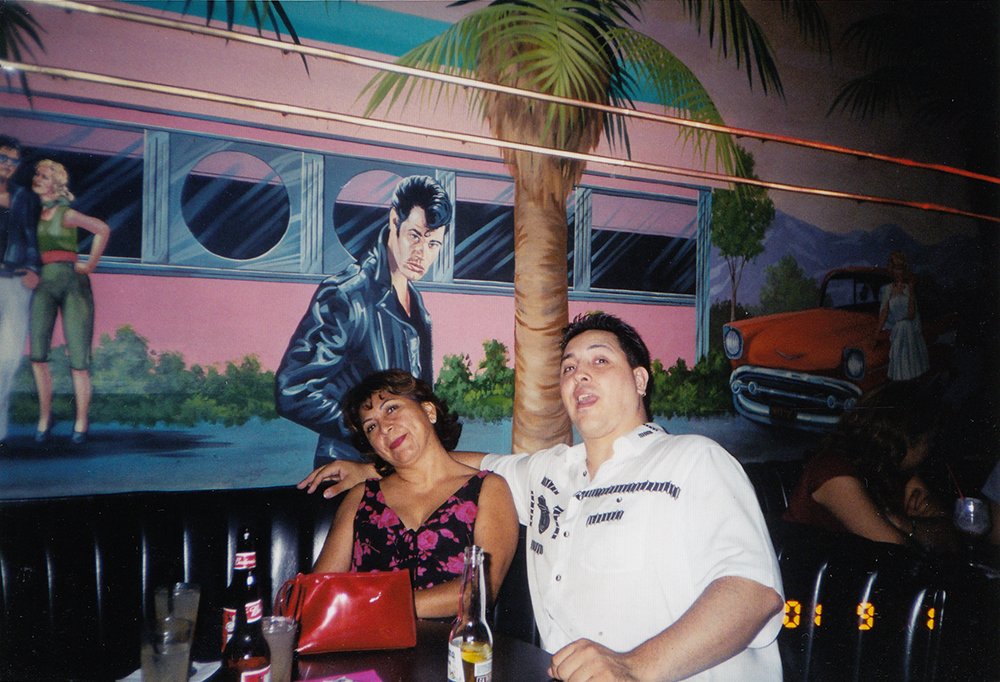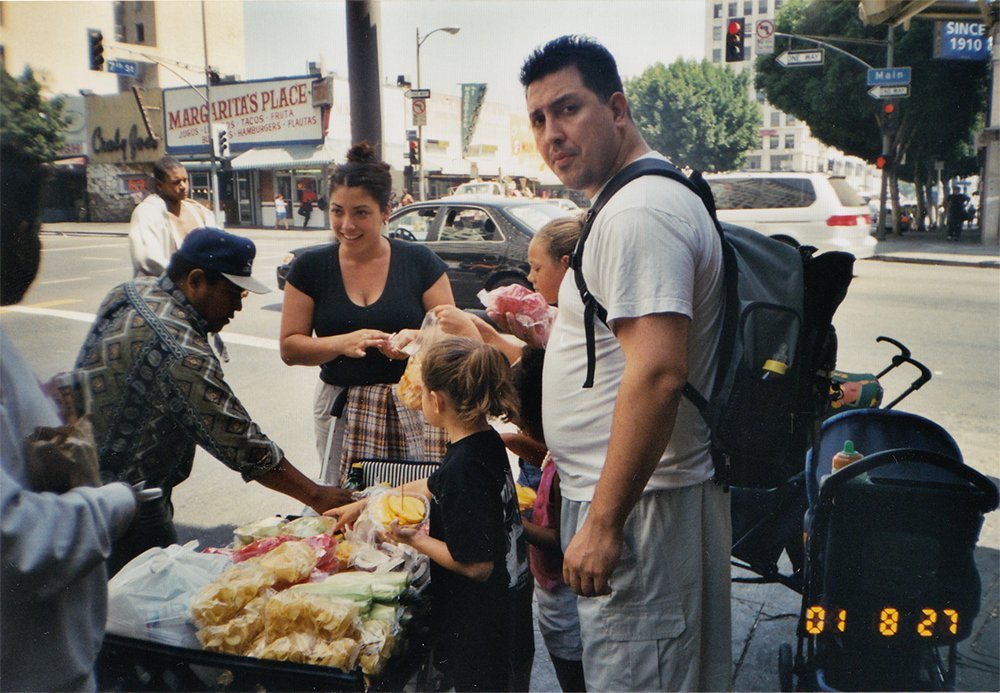.___.__ .__.. .
[__ [__)| ||\/|
| | \|__|| |
.__..__ .__..__ .___. . .__.
[__][__)[__][__)[__ | | [__]
| || \| |[__)[___|___|___| |
.___..__. .__..___.. . __..__.
| | | [__] _/ | |(__ [__]
| |__| | |./__.|__|.__)| |
/ .__ .__..__ .___. _, \
( [__)[__][__) | '_) )
\ | | || \ | /_. /
Alex pours me another Pepsi. He himself is diabetic, so he has to hold back. He may not drink more than one glas. I notice how Alex is pushing around a bit. He wants to tell me who else was standing outside the door of the TV studio, back in the summer of 2001. Who else had Arabella found? But Alex needs a little courage for that, it seems. Above all, he has to go further...
It's 1992, and Alex has been back in Friedberg for six years. Shortly after his birth, Alex's mother had met another American soldier, from whom she was soon expecting a second child. Alex's brother was born - half-brother, he corrects himself - the distance, the lack of interest that the two have in each other, is, according to Alex, also based on this circumstance. The Hawaiian stepfather turned out to be a complete mistake - alcohol and domestic violence finally led to the separation of the German-American couple. Alex and his little half-brother came to live with a foster family, not a peculiarity for single women working shifts in the restaurant industry - even today. Few industries are less considerate of the circumstances of their employees. Rosters in the restaurant industry left no time to adequately care for her sons. At sixteen, Alex ran away from his foster parents, set out on his own to find his mother, big enough to fend for himself. One day he was standing in front of her, at the bar of an old town pub. The mother got him jobs, as a waiter, bartender, bouncer, introduced him to the scene. Alex quickly became part of the milieu in which his parents met. Entertained, drank and partied with the Americans, quickly made short, intense friendships. Most of the American soldiers had been in the city for no more than two years. That's how they lived, that's how they partied, that's how they drank, danced, loved - as if there was no tomorrow. And Alex in the middle of it all. Somehow one of them, he let himself be drawn into the frenzy. While his American friends fell in love with Wetterauer girls, Alex lost his heart to the still underage daughter of an American officer. As much as the Father of two tried to keep his daughters away from the party life of provincial Hesse, but nevertheless their desire for freedom, parties, boys and adventure grew. In America, you couldn't buy alcohol until you were 21; in Germany, you could buy it at 16. "If you didn't take advantage of that, it was your own fault." However it was exactly, Alex and the young American girl liked each other very much. One day she asked him to come to her home, the family's departure was imminent, there was still something to talk about. Alex made his way to the housing area, he rang the doorbell, his girlfriend came to meet him, a book in her hand, a collection of American first names for babies - she was expecting Alex's child.
Shortly after Alex knew that now he, too, would become the father of half an American, the apartment door opened. The father, the officer, the soldier trained in hand-to-hand combat took a peep. He looked Alex in the eye, asked briefly and harshly if he was the one who ruined his daughter's life? Alex nodded, the officer asked to wait a moment, he had to get his knife quickly. Alex took to his heels. The very next day, his girlfriend and her family flew back to the United States. Alex did not know where they were going. He had no phone number, no address, and no messages or phone calls reached him.
And then, almost ten years later, in a television studio in Munich, the door opens and Alex faces his young son for the first time. Next to Alex, his aunt Esther, great-aunt of the boy. Before the eyes of millions of viewers, a transatlantic patchwork family comes together. Even today, Alex finds it difficult to describe the roller coaster of emotions on which he rode during those minutes. Sure, he had been looking for this moment, conjuring it up, and yet what is happening inside him now is almost too much for one person.
Alex can't describe it. Even today, twenty years later, the merry-go-round of emotions overwhelms him. His gaze turns inward, as if he were standing in the Munich television studio again. "Alex?" I bring him back to reality. "Sorry," says the likeable man from Friedberg, "but now we're just getting to the part I actually wanted to tell you about. And that is Alex's trip to the USA. Again he searches for words: unforgettable, wonderful, one superlative follows the next.
He opens the photo albums, starts to tell about the trip to California, the unknown homeland, feelings hang on every picture, memories hang on. Alex says in California, surrounded by his father's family, surrounded by Hispanics, he felt belonging for the first time, felt at home for the first time, among his own kind.
"Feeling like: this is where I belong. These are my people, even if they speak a different language." Spanglish is what relatives call their mix of Spanish and English. Urgently, he says, he needs to learn it to become truly one of them. Buy a house Alex, they call out to him. Life in America is within reach, a new beginning, the German nuclear family would simply be integrated into the extended family of Alex's father. Just 30,000 dollars costs a small house with garden in Azusa at that time.

Alex, his first wife and daughter spend most of their time at Aunt Ester's, Alex's birthday they celebrate together – in an upscale Japanese restaurant with a table barbecue, later a danceclub. Behind them lie carefree weeks full of new impressions, warm encounters, family affection. Then two planes fly into the towers of the World Trade Center in New York, and the world was never the same again. Alex is in America at the time of the event, and feels how the previous openness he encountered everywhere disappears, how barriers go up, a country in a state of shock. Frenzied standstill. But Alex has appointments to make during this time, moving north by car through a completely different country to the prison where his father is incarcerated. Six hours, pure excitement. Seeing his father for the first time. Under such circumstances, in prison. Around Alex, America is arming itself. In large and small ways. But even if it seemed impossible before, all that becomes unimportant, for the moment when father and son face each other for the first time, recognize each other. They look alike, face each other, no distance, enormous familiarity. "It's like we chill with each other every day."
When father and son first sit across from each other in the detention center, it's been three weeks since Alex landed in LA. He has already become someone else in that short time. He tells his father about attending the annual family reunion to which his sister Esther had taken him; tells how it took him a while to realize that he is related to all these people in one way or another. Standing in a park, the Wetterau nuclear family was suddenly part of an extended American family of nearly a hundred. And they all came to greet Alex, to shake his hand, to introduce themselves.
"Hello I'm cousin," "I'm your aunt," "I'm great-great cousin" Alex's eyes light up, even twenty years later. They present him with gifts: free admission to Disneyland, a ride in a limousine, Alex names the highlights, still breathlessly narrating. They want to go to Tijuana with him, to Mexico. Alex doesn't yet know that nothing will come of it. Back in the park, at the BBQ, in the soft light of late summer, the towers of the WTC are still standing.
The father listens curiously as the son reports. Then it is his turn, he has prepared himself, takes a breath, goes far back in his memories. To support the family, his parents and eight sisters, he had joined the army. An immigrant story. Then the warnings, the missteps, the rule-breaking. He tells of the problems with drugs, how that began in the Army, in Friedberg. which finally culminate in the dishonorable discharge of Private Negretes. He had wanted to take his mother with him, but her Wetterau roots were too strong, she could not imagine going to America, marrying the American with the fast fists and nickname Negro, in California far from the Hessian home, the family. Far from the pulsating old town of Friedberg with its discos, its bars and pubs. No, as much as she liked the temperamental man, she stayed in Germany and has never regretted the decision. Shortly after Alex's birth, she meets another American soldier, from whom she soon expects a second child. Alex's brother is born - half-brother, he corrects himself, the distance, the disinterest that the two have in each other, according to Alex, is also based in this circumstance. The stepfather, who comes from Hawaii, turns out to be a complete mistake. Alcohol and domestic violence lead to the separation of the German-American couple. Alex and his little half-brother come to live with a foster family, not a peculiarity for single women working shifts in the restaurant industry, even today. Few industries pay less attention to the circumstances of their employees. Alex's father nods. Today he knows that his partner at the time probably made the right decision. Back in the USA, Alfredo Negretes did not get back on track. The drugs, the alcohol had already become too much a part of his life, a life between intoxication, acquisitive crime and prison begins and ends for the time being with the sentence to 20 years in prison. An understandable punishment for a repeat offender, as Alex finds, and thus also repeats the words of his father. When Alex meets him in prison, he has been in for five years, has accepted his sentence, sees its meaning and vows to mend his ways. Later, in letters, he admonishes his son not to make the same mistakes he did. He means well, but Alex will resent him. Why? Alex, who tries very hard not to blame his father for his absence, who emphasizes again and again that he has never missed his father, gets a little angry now, too: How the father would come to dictate his behavior to him. He was never interested in him, he was never there, and now he is telling Alex what he should and should not do? I know he meant something completely different, but still...

Alex tries not to show his disappointment. The last time the two saw each other, on Skype, shortly after the dismissal of the father in 2015, there was a fight. Alex does not want that and did not want that. With his aunt Ester and her children, there is still contact, cordial and regular exchanges. Alex also wants to reconcile with his father. It has been twenty years since he was last in America. The next trip is already planned. This
Alex will come with his new partner. And this time it's also about his son. Alex wants to do things differently than his father. The two watched the Arabella episode together for the first time the other day. Alex had goose bumps. A lot of things have not yet been processed. And the longing is there...

